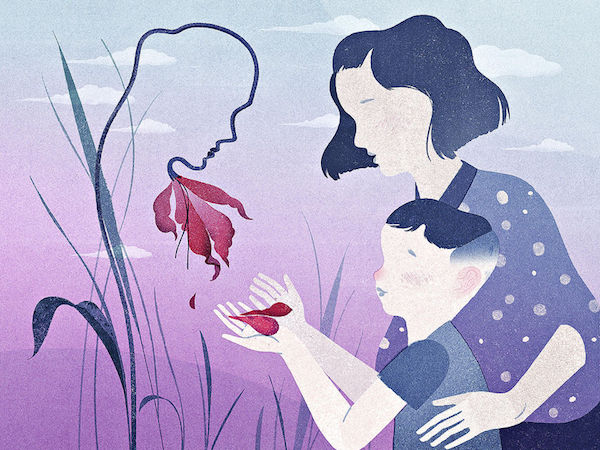
Not so long ago, a sweet child in my community—my kids’ buddy from preschool—was killed in an accident. For a full year, I descended into dark periods of deep grief. Fortunately, I also often rose to the occasion, cooking for their family and standing strong for mine. The kids describe that year as “the time when mommy cried a lot.” The horror and disbelief and deep loss when a child dies are truly unimaginable, truly indescribable.
There are a lot of families in Berkeley who are probably in that hard place right now. Two weeks ago today, a kindergartener dear to the Berkeley campus was killed in a traffic accident. He would have been six yesterday.
It is hard enough as parents to deal with our own strong feelings when children die. But how in the world do we also help our children cope with their grief?
The grieving process itself is very different for kids than it is for adults. Because kids’ capacity for sustained intense emotion is limited, they may experience bouts of sadness and anger but then go off to play or immerse themselves in activities. This can be confusing to parents, who misread the child’s ability to play and laugh as an indication that either the child is no longer grieving or doesn’t understand what has occurred. Neither is true; the behavior is a defense mechanism that protects kids from becoming overwhelmed.
Depending on age, kids understand death to varying degrees.
- Infants under 3 may notice an absence in their immediate world, but most likely do not understand the difference between a temporary and permanent absence.
- Preschool kids usually see death as reversible, temporary, and impersonal. Their deceased loved ones might return, just as cartoon characters on television miraculously recover. Most kids under 5 do not realize that everyone, including themselves, will eventually die.
- Kids between 5 and 9 begin to see death as final and to understand that all living things die, but many still believe that it may just be possible to escape through ingenuity.
- By age 9 or 10, most kids understand that death is final, permanent, and inevitable.
Grief also usually lasts longer for kids: parents will need to revisit and readdress the loss at different points in the child’s life, especially during important events (like birthdays and graduations). Because kids often have difficulty articulating their feelings, grief can manifest in a variety of conflicting ways, including emotional shock or apparent lack of feeling, explosive anger, acting out behavior, fears of abandonment or death, immature behavior, or repeatedly asking the same questions.
Here are some more research-based ideas for helping kids cope with death:
Give them information. When asked what helps grieving kids most, Dr. Grace Christ from Columbia University says, “It is hard to overestimate the importance of giving children information at all stages.” Parents can help kids understand how and why a death occurred in simple, honest, age-appropriate terms.
Don’t tell half-truths. Saying things like “your uncle went on a trip” can prevent kids from developing effective coping strategies. Vague euphemisms (referring to death as “sleep” or “eternal rest”) are similarly problematic because they can be frightening and confusing.
Let kids talk about it. Repeatedly. Kids need to have opportunity to put their feelings into words. They may be anxious about the safety of other loved ones or themselves. Or they may be feeling guilty about times they weren’t nice to the deceased, or sad thinking about opportunities they missed to show affection. Kids will do better if they can express feelings like these to people who can provide the clarification and reassurance they need to heal. Encouraging other expressive outlets like drawing, painting and playing can also help.
Find ways to honor and remember the deceased. Research shows that instead of focusing on letting go and moving on, maintaining a link to the loved one can provide comfort and solace. The “continuing bonds” theory suggests we can move through grief by creating a new bond to the lost person. Activities might include putting together a memorial, gathering photos and creating a special album, or reliving memories together.
Read relevant books together. Books are often a wonderful way to help kids understand death. Kids may also project their feelings onto the story characters and engage in a dialogue in a non-threatening way.
Encourage death games. Kids will sometimes play “death games” in which they stage deaths, funerals, and other imaginative happenings. This type of game is a constructive way for kids to talk about death and work out anxieties in a relatively safe space.
Finally, we parents need to remember and honor our own need to grieve. I did better helping Fiona and Molly cope with our friend’s death once I had started to take care of myself and my own grief. I needed to allow myself (and my kids) some time away from our everyday activities to grieve and heal.
Grieving is an ongoing process, not an isolated event. My heart goes out to all those families who are in grief right now. If your family has dealt with a significant death, please help other families by adding your comments and suggestions (what are some good kid’s books for coping with death?) for how you healed below.
Complete Article ↪HERE↩!
